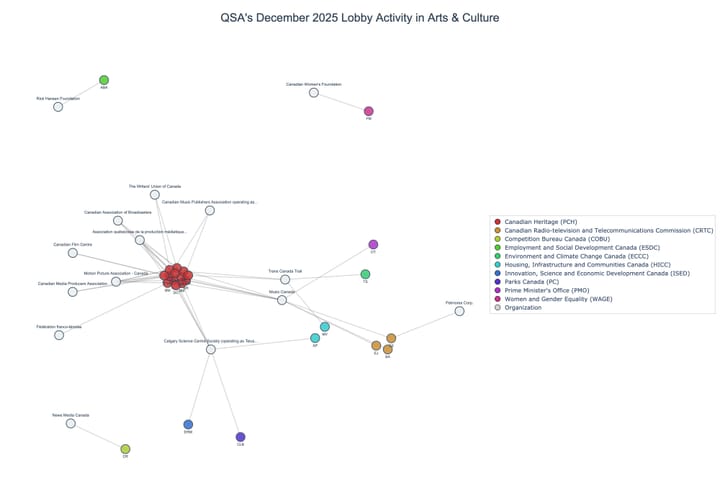QSA's Week in Arts & Culture (#43, 2025)
CHPC committee examines AI’s impact on creative industries; Bill C-8 advances telecom cybersecurity; NFB launches 16 new film projects; Record school enrolment reported; Official languages funding moves; G7 digital ministers’ meeting scheduled for December in Montréal.

Good morning! This is Queen Street Analytics' weekly roundup of regulatory developments, legislative discussions, political announcements and other government-related news for professionals in the performing arts, museums, theatre-operators, event-spaces, Canadian and Francophone trad media and social media publishers, and broadcasters. Every Monday, we break down the most important updates in this space in under five minutes.
Want to track other GR news in industries related to Arts & Culture? Don’t miss this week’s updates in Hospitality & Retail.
Dates: 2025-10-26 to 2025-11-01
📋 In This Week's Newsletter
• 🏛️ This Week's Parliamentary Committee Calendar
• 🇨🇦 Canadian Federal GR News
• 🗺️ Canadian Provincial GR News
• 📚 What We're Reading This Week
This Week's Parliamentary Committee Calendar
- Justice Committee to Hear Bill C-9 on Hate Crime and Cultural Places: On November 6, the Justice and Human Rights Committee will meet to study Bill C-9, concerning hate propaganda and access to religious or cultural sites, with testimony from the African Nova Scotian Justice Institute, Canadian Constitution Foundation, and Hindu Canadian Foundation, among others.
- Canadian Heritage Committee Continues Study of AI in Creative Industries: CHPC is scheduled to meet on November 3 to discuss AI’s effects on creative industries, with witnesses from the Directors Guild of Canada, the Entertainment Software Association of Canada, and digital artist Eric Chan.
- Senate Committee on Official Languages Discusses Strengthening Arts, Culture, and Heritage in Minority Communities: The Senate Standing Committee on Official Languages will meet in camera on November 3 to examine arts, culture, and heritage responsibilities within official language minority communities and address minority-language health services.
Canadian Federal GR News
Parliamentary Committees Tackle AI’s Role in Creative Industries
The House of Commons Standing Committee on Canadian Heritage (CHPC) convened on October 29, with testimony from legal and industry experts on artificial intelligence’s (AI) impact on creative industries. Michael Geist of the University of Ottawa called for balanced AI regulation to maintain innovation without impeding creator rights, while Véronique Guèvremont from UNESCO urged protections for minority cultures within AI governance. Chip Sutherland, entertainment lawyer, advocated for robust funding and clear copyright protections in music, voicing concern about data mining under fair use. Nikita Roy from Newsroom Robots Lab observed that AI is reshaping journalism, with a focus on cultural sovereignty and creator rights. Vicky Mochama of Press Forward stressed the necessity of human editorial oversight to maintain public confidence. Panelists uniformly called for nuanced, transparent legislative frameworks and international collaboration to ensure Canadian cultural interests are preserved as AI adoption accelerates.
Sources: parlvu.parl.gc.ca

Further Testimony on AI Governance in Canadian Media and Culture Production
The CHPC’s October 27 meeting heard multiple viewpoints on AI’s role across Canada’s creative industries. Speakers including Alexandra Kearney (Artificial Agency) discussed AI tools’ potential for empowering creatives, particularly in gaming, while Wyatt Tessari L’Allié (AI Governance and Safety Canada) urged comprehensive government responses in the face of rapid AI advancement. The Canadian Media Producers Association, represented by Alain Strati and Lisa Broadfoot, emphasized traditional media's human-centered production processes and pointed to AI’s threat to established roles. Issues raised included copyright, remuneration, and transparency obligations. Witnesses from Québec’s AI research chair and the Société des auteurs et autrices de radio, télévision et cinéma proposed integrating research data into policy frameworks and called for stringent safeguards for creator’s rights.
Sources: parlvu.parl.gc.ca
LANG Committee Studies Federal Role in French-Language Education and Bilingualism
The House of Commons Standing Committee on Official Languages (LANG) addressed technical barriers in testimony from the Association canadienne-française de l'Alberta, leading to plans to reschedule witnesses. Ronald Ajavon (Conseil des écoles fransaskoises) and Marco Fiola (Glendon College) pointed to challenges in French education and discussed the need for predictable federal funding. Historical perspectives on the evolution of French-language laws and prioritization in federal policy were raised by MPs. Alberta and Saskatchewan representatives cited underfunding and assimilation pressures, leading to proposals for increased and flexible funding. The committee supported a motion to expedite regulations under the new Official Languages Act, reflecting ongoing debate over application and pace of federal intervention in official languages and education.
Sources: parlvu.parl.gc.ca
LANG Committee Chronicles Barriers Facing Francophone Education in Ontario and Nunavut
At the October 28 session, LANG Committee witnesses including Martine St-Onge (Association francophone à l'éducation des services à l'enfance de l'Ontario) reported only 27.2% of eligible French-speaking children in Ontario have access to educational centres, and suggested increasing spaces, funding, and retention measures. Judy Romaric Sessua Kuengou (Nunavut) described opening Nunavut’s first French-language high school after legal proceedings, but noted ongoing barriers like funding and teacher housing. Witnesses highlighted the relationship between federal responsibility and local programming, with discussions on immigration as a workforce solution and better integration of early childhood and schoolboard services.
Sources: parlvu.parl.gc.ca
Senate Discusses Official Languages Act Regulatory Development and Treasury Board’s Oversight
The Standing Senate Committee on Official Languages (October 27) reviewed the Treasury Board Secretariat's new leadership role in implementing the Official Languages Act. Carsten Quell detailed the Centre of Excellence’s activities, including advisory meetings and policy instrument development, while Jacinthe Bourdages (Department of Justice) referenced collaboration with multiple departments to align regulations with the Charter. Senators pressed for clarity on definitions, regulatory timelines, and the function of linguistic clauses. The committee examined performance measurement, regulatory drafting, and resource allocation.
Sources: senparlvu.parl.gc.ca
Bill C-8: Committee Reviews Cybersecurity Amendments to the Telecommunications Act
The House of Commons Standing Committee on Public Safety and National Security (SECU) studied Bill C-8, which proposes mandatory incident reporting and expanded emergency powers for the Minister to protect critical telecom infrastructure. Bridget Walshe (Canadian Centre for Cyber Security) detailed provisions to bolster industry-government collaboration. MPs questioned judicial oversight, warrant requirements, and data confidentiality, with witnesses explaining intended safeguards against misuse of power and steps towards transparent emergency response. The bill’s design applies administrative penalties, requires reporting of significant breaches, and incorporates court review for information requests. Financial impact of cybersecurity—especially for SMEs—was raised in the context of compliance responsibilities.
Sources: parlvu.parl.gc.ca
House of Commons Debates Multiculturalism Act Amendments and Canadian Citizenship Laws
On October 27, the House debated Bill C-245, which would exempt Québec from the Canadian Multiculturalism Act, reflecting the ongoing debate around the province’s distinct integration practices. Bloc Québécois MP Barsalou-Duval advocated for recognition of Québec’s unique identity, while critics cited the Act’s current recognition of regional differences. Proceedings also covered Bill C-3, which would amend citizenship by descent for people born outside Canada, sparking discussion on "lost Canadians" and potential policy risks. Ancillary debate touched on food insecurity, U.S. tariffs in the forestry sector, and calls for a review of the Conflict of Interest Act.
Sources: parlvu.parl.gc.ca
NFB Announces 16 New Productions in Film and Animation
The National Film Board of Canada announced sixteen new productions and co-productions were greenlit between January and September 2025. The slate includes seven feature-length documentaries, five short docs and series, and four animated shorts across NFB units. Projects range from documentaries on the arrival of the Michelin Guide in Quebec to historical pieces on poutine, environmental documentaries about the Yukon River salmon, and animated explorations of urban life and Canadian history. The announcement spotlights the breadth and diversity of content under development and positions both emerging and established Canadian voices across multiple genres and topics.
Sources: Announcements: www.canada.ca
Federal Funding Backed for Mi’kmaw Cultural Centre in Nova Scotia
$20 million in federal funds, matched by the Mi’kmawey Debert Cultural Centre, will enable construction of a major new Mi’kmaw cultural facility in Debert, Nova Scotia. Announced October 31, the project supports land-based education and language programs, incorporates climate resilient and net-zero carbon building features, and anticipates attracting over 67,000 annual visitors. The centre’s offerings will include Mi’kmaw cultural programming, healing spaces, and workshops, reflecting a long-standing Indigenous heritage in the region.
Sources: Announcements: www.canada.ca
Canada Prepares to Host G7 Industry, Digital, and Technology Ministers’ Meeting
Media accreditation has opened for the G7 Industry, Digital and Technology Ministers’ Meeting, to be co-hosted by Ministers Mélanie Joly and Evan Solomon in Montréal on December 8–9, 2025. The process requires journalists to provide formal credentials by December 1 to attend. Official proceedings will gather international officials to discuss cross-border digital policy and industry topics, with journalists granted access once accredited.
Sources: Announcements: www.canada.ca
National Film Board Tributes Filmmaker Gilles Blais
The National Film Board of Canada paid tribute on October 31 to filmmaker Gilles Blais, who passed away at age 84. With more than three decades at the NFB, Blais directed numerous influential documentaries, including works on Quebec society, bioethics, and Indigenous communities. Key films include 'The Engagement,' awarded at Hot Docs, and 'Joseph K. L’homme numéroté.' His career included international projects in Tunisia and Africa and spanned both documentary and fiction formats.
Sources: Announcements: www.canada.ca
Canadian Provincial GR News
Ontario Invests $7 Million in Literary Arts and Publishing Sector
Ontario is investing more than $7 million in 2025–26 to support literary arts, authors, and publishers, including $5.1 million via Ontario Creates, $1.9 million through the Ontario Arts Council, and festival grants exceeding $100,000.
Sources: news.ontario.ca
Government of Quebec Provides Nearly $300,000 for Montreal’s Digital Week Festival
$296,980 in funding has been allocated by Quebec to Printemps numérique for MTL Connecte: The Digital Week of Montreal, supporting digital arts and connecting international broadcasters and curators with local programs.
Sources: www.quebec.ca
What We're Reading This Week
- CBC News: Arts sector contributes billions to Canadian economy, but funding challenges remain: report: A recent report details the sector’s economic contributions and persistent funding issues.
- CBC News: Education authority brings elders together to preserve Mi'kmaw knowledge and history: An education initiative supports elders in sharing Mi'kmaw cultural knowledge.
- CTV News: Bernard Grandmaître, ‘Father of the French Language Services Act’ in Ontario, passes away: Bernard Grandmaître, key to Ontario's French Language Services Act, has died.
- CBC Arts: For small town cinemas across Canada, the show must go on: Small town cinemas in Canada continue operating amid changing audience habits.
- CTV News: Fanshawe College seeks community partnerships to keep student-run radio station operational: Fanshawe College explores partnerships to sustain its student radio station.
- Toronto Star: What the Star’s culture team is loving this week: The Star’s culture team shares recent favorites in arts and entertainment.
- CTV News: Audit finds federal department couldn’t account for 132 Indigenous artworks: An audit reveals unaccounted Indigenous artworks in a federal department’s collection.


